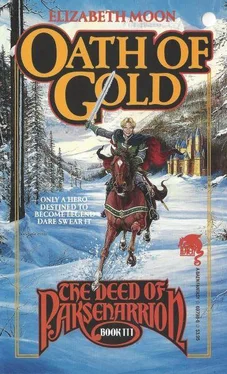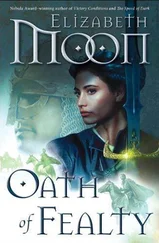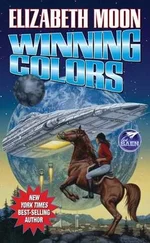Paks sank gratefully into the chair he gave her. “I wasn’t sure myself.” She felt as if all her strength had run away like water; she didn’t want to think about moving again.
“Five days!” She wasn’t sure if the emotion in his voice was surprise or elation or both. “This will show those—!” He banged a kettle on the rack, and moved around the room, gathering dishes and food. “I won’t ask what they did, Liart’s bastards, but—I presume you need healing, eh? Rest, food, drink—we can do that—” He set a loaf down on his desk, and a basin of clean water, then came to her, easing the hood back from her head. His breath hissed at what he saw.
“Damn them,” he said. His hands were warm and gentle. “Some of this needs cleaning.” Paks winced as he worked at one cut and another with a clean rag. “What’s this?” He touched a swollen lump on the back of her head.
“I don’t remember—the stairs, maybe.”
“Let’s see the rest of the damage.” He helped Paks out of her clothes. By the time the water boiled, he had cleaned all the festering wounds—not many—and she was wrapped in a soft robe.
“There isn’t as much as I’d expected,” he said, handing her a mug of sib. “Five days and nights—” Paks took a long swallow; the sudden attack of weakness had passed, and she was even hungry again. “There was more.” Paks sipped again. She did not want to say how much; the memory sickened her. “Broken bones, more burns. They’re—gone—” She waved her hand, unable to explain.
“Your own gift healed some of it, no doubt. Perhaps Gird himself the rest—I’ve heard of that. And left just enough to witness what you’d suffered. As the Code says: scars prove the battle, as sweat proves effort. But with your permission, I would pray healing for the rest, and restore your strength. I daresay none will question your experience now.”
Paks nodded. “Thank you, Marshal. I cannot—”
“No. You have done all you can; the gifts bring power but consume the user as well. That mark on your forehead—”
Paks grimaced. “Liart’s brand. I know.” She remembered too clearly the shape of that brand; they had shown her in a mirror the charred design.
“That’s not what I see—have you looked? No, how could you—but here—” he handed her a polished mirror; Paks took it gingerly. Her bald head patched with scrapes and cuts looked as ridiculous as she’d thought—bone-white between the red and purple welts, smeared now with greenish ointment, and bristling with pale stubble where her hair was coming back. Beneath, her tanned face hardly seemed to belong to it. But the mark on her forehead was no longer the black horned circle of Liart. Instead a pale circle gleamed like silver. She nearly dropped the mirror, and stared at Marshal Torin.
“It can’t—”
“Whatever happened, Paksenarrion, the High Lord and Gird approved; I have heard of such things. Such honors are not lightly won. It is no wonder you are still worn by your trials.” She told him then what Arvid had said: rumor, panic, wild tales told by thieves, and unreliable. But if the brand could change like that, and deep burns disappear, what might the truth be? Marshal Torin nodded, eyes alight.
“Yes!” he said when she stopped. “The gods always have more than one purpose. Certainly you were sent to save more than a king, and from that dark warren Gird will gain many a yeoman, many a one who knows that fear is not the only power. Well done, paladin of Gird: well done.”
After eating, Paks managed to stumble down the passage to one of the guest chambers. She was asleep almost before the Marshal covered her with blankets.
When she woke, she knew at once that her injuries were healed. She could breathe without pain. The lump on her head was gone, though she could feel uneven ridges of painless scar where cuts and burns had been. She scratched the bottom of one foot with the other; those burns were gone. She looked: scars to witness her ordeal, but nothing left of the weakness and pain. And a clear call to follow . . . she had not finished this quest yet. As she threw the covers aside and sat up, the Marshal tapped on her door.
“Paksenarrion?”
“Yes—I’m awake.”
He looked in. “I would let you sleep longer, but that horse of yours is kicking the door.”
“Gird’s arm. I forgot him.”
“He’s all right—I fed him after you fell asleep. But he’s decided he needs to see you, I suppose. I told him I don’t eat paladins, but—”
“How long did I sleep?”
“It’s still dark, but morning.”
Paks had followed him along the passage, still in the robe she’d slept in; she could hear the steady thumps of the red horse’s hoof. The Marshal opened the door, and the horse poked his head into the room.
“You,” said Paks. The horse snorted. “I’m all right. I’m getting up. I’ll eat before I ride, though.” The horse snorted again. “And so should you,” said Paks severely. “You could have let me sleep till daylight.” The horse leaned into the room, and Paks held out her hand for a nuzzle. “Go on out, now; it’s cold. I won’t be long.” The horse withdrew, and the Marshal closed the door.
“I thought I bolted the door to the stable,” he said.
“I’m sure they bolted the stable door in Vérella,” said Paks. “That horse goes where he wills. I’d better get ready to ride.”
Paks found that she had been left clean clothes as well as her mail and sword. Even boots that fit. Paks hurried into her clothes, then realized her helmet would not fit without her thick braid of hair coiled into it. Finally the Marshal found her an old knitted scarf that served well enough. Back in her own mail, with a sword at her side once more, she felt completely herself. By the time they finished eating, and she had fastened her saddlebags onto the saddle, the eastern sky was pale green with a flush of yellow near the horizon. She mounted, and turned the red horse toward the road. He stopped short, ears pricked at something west down the road. Paks glanced down at the Marshal, who had walked out with her.
“I don’t know,” he said. “But he thinks there’s something—”
“I’d believe it,” said Paks. She drew her sword, and settled herself in the saddle. She heard the Marshal’s blade coming free from his scabbard. Now the red horse snorted, blowing rollers in the cold dawn wind. He tossed his head, and loosed a resonant whinny.
“That doesn’t sound like trouble,” said the Marshal. “And it’s not spring yet.”
Paks chuckled, thinking of the red horse with a herd of mares. “I don’t think that’s it.” The horse whinnied again, and began prancing sideways. “What’s got into you, you crazy horse! Settle down.”
“Hush,” said the Marshal. “I think I hear something—”
Paks strained her ears. A faint echo of the red horse’s whinny? The wind died. Now she could hear it clearly: the drumming clatter of many hooves, the squeak and jingle of harness. She felt the hairs on her neck prickle up. She rode into the center of the road and peered west. Was that a dark mass moving in the distance? And who could it be?
“It might be the Guard,” said the Marshal slowly, echoing her thought.
“Liart,” said Paks. “They let me go, all right, and now they’re after the king in force.”
“Six—seven—days late?”
“It must be. What else?”
He shook his head, but said nothing for a moment. The early light, still faint, showed the front of the mass of riders moving steadily toward them.
“You won’t try to hold them.” It was half question. Paks estimated the size of the troop and shook her head.
“I couldn’t, not here. I’ll try to reach the king first, and then see what I can do.”
Читать дальше












